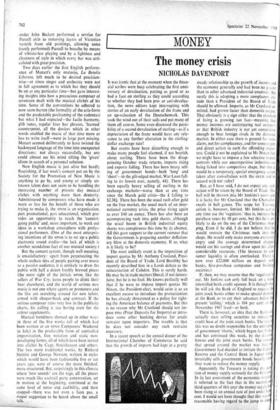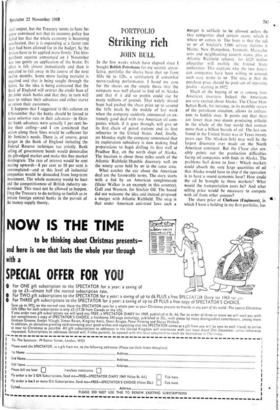The money crisis
NICHOLAS DAVENPORT
It was ironic that at the moment when the finan- cial scribes were busy celebrating the first anni- versary of devaluation, putting as good or as bad a face on sterling as they could according to whether they had been pro- or anti-devalua- tion, the news editors kept interrupting with stories of an early devaluation of the franc and an up-valuation of the Deutschemark. This took the wind out of their sails and put many of them off course. Some even discussed the possi- bility of a second devaluation of sterling—as if a depreciation of the franc would have any rele- vance to any further alteration in the sterling- dollar exchange rate!
But events have been disturbing enough to make many people feel alarmed, if not bearish, about sterling. There have been, the disap- pointing October trade returns, imports rising and exports falling. There has been heavy sell- ing of government bonds—both 'long' and `shore—in the gilt-edged market, War Loan fall- ing to its lowest ever, namely, 44f. There has been equally heavy selling of sterling in the exchange markets—worse than at any time since the March gold crisis—the £ falling to $2.381. There has been the usual rush after gold on the free market, the usual mark of an inter- national currency crisis, the price rising again to over $40 an ounce. There has also been an accompanying rush into gold shares, although the usual boom in British industrial equity shares was conspicuous this time by its absence. All this gave support to the current rumour that the Government is preparing another deflation- ary blow at the domestic economy. If so, what is it likely to be?
The most unlikely event is the imposition of import quotas by Mr Anthony Crosland, Presi- dent of the Board of Trade. Lord Boothby has recently described him in a Lords debate as the reincarnation of Cobden. This is surely harsh. He may be in trade matters liberal, if not laissez- faire, but he is no fool. He knows perfectly well that if he were to impose import quotas Mr Nixon, the President-elect, would seize it as an excellent excuse to introduce the protectionism he has already threatened as a policy for right- ing the American balance of payments. But this is no reason why Mr Crosland should not im- pose iron (Prior Deposits for Imports) or intro- duce some other banking device for credit restraint upon importers. The trouble is that he does not consider any such restraint necessary.
In a recent speech at the annual dinner of the International Chamber of Commerce he said that the growth of imports had kept in a pretty
steady relationship to the growth of income and the economy generally and had been no greater than in other advanced industrial countries. But surely this is adopting a more complacent atti- tude than a President of the . Board of Trade should be allowed. Imports, as Mr Crosland ad- mitted, had grown faster than domestic output. That obviously is a sign either that the standard of living is growing too fast—meaning that money incomes are outstripping real output— or that British industry is not yet competitive enough to beat foreign rivals in the domestic market. In either case there is ground for some alarm, not for complacency, and for some urgent and direct action to curb the offending impor- ters. Could it not be explained to Mr Nixon that we might have to impose a few selective import controls while our uncompetitive 'industries are being licked into competitive shape, but that it would be a temporary;'special emergency action taken after consultation with the OECD and in accord with IMF rules?
But, as I have said„.I do- not expect am AO action will be taken by the Board of Trade. The ball will be thrown into Mr Jenkins's court and it is lucky for -Mr Crosland that the Chancellor excels in ball games. The scope for Treasury action is, however, limited. Mr Jenkins can a: any time use the 'regulator,' that is, increase the purchase taxes by 10 per cent, but this he is un- likely to do on the eve of the Christmas shop- ping. Even if he did, I do not believe that he would restrain the Christmas rush into the shops. He would only make everyone extremely angry and. the average determined shopper would cut his. savings and draw upon his often considerable resources. (The increase in con- sumer liquiditY is often overlooked. There is now over £22,000 million on deposit with banks, hire-purchase companies and building societies.) If; then, we may assume that the `regulator's out, Mr JenkinS can only fall back on a mor intensified bank credit squeeze. It is thought tha he will ask the Bank of England to request al joint stock banks either to make special deposit at the Bank or to cut their advances below th present 'ceiling,' which is 104 per cent of th November 1967 level—or both:
There is, however, an idea that the Bank WI actually start selling securities to reduce t
' credit base of the joint stock banks. The tear 0 this was no doubt responsible for the unloadin of government 'shorts,' which began last Frid and has continued this week, by the di houses and the joint stock banks. The ru:r., that spread around the market was that th Government had decided to imitate the Feder Reserve and the Central Bank in Japan whi invariably sells government bonds heavily oh• they want to reduce the money supply.
Apparently the Treasury is taking the qu tion of money supply seriously for the first ti In its last assessment of the economic situate it referred to the fact that in the second a third quaiters of this year the money supPl) b been rising at an annual rate of just under 6 cent. I would not have thought that this was reasonable having regard to the jump in end trial output, but the Treasury seems to have be- come convinced not that its incomes policy has failed but that the whole economy is becoming overheated, that it is expanding at a faster rate than had been allowed for in the budget. So the brakes have to be applied more firmly. The hire- purchase squeeze announced on 1 November was too gentle an application of the brake. Its effect is felt almost immediately and then is expected to fall away in the course of the next twelve months. Some more lasting restraint is required and that is being sought through the banks. So the idea is being canvassed that the Bank of England will restrict the credit base of the joint stock banks and that they in turn will have to reduce their advances and either starve or ration their customers.
It happens that I suggested in this column on 8 November that the banks should be forced to make selective cuts in their advances—in Octo- ber bank advances were actually 1 per cent be- low their ceiling—and I am convinced that action along these lines would be sufficient for Mr Jenkins's needs. There is, of course, great danger in the Bank of England imitating the Federal Reserve technique too strictly. Bank selling of government bonds would demoralise the gilt-edged market and make this fine market disintegrate. The rate of interest would be sent soaring upwards-8 per cent to 10 per cent is contemplated—and at this level all industrial companies would be dissuaded from long-term investment. The whole economy would be hurt and the competitiveness of British industry un- dermined. This must not be allowed to happen. I beg the Treasury to do nothing so foolish as to imitate foreign central banks in the pursuit of the money supply theory..



































 Previous page
Previous page